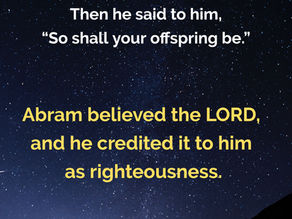Colossians 1:1-5 - When The Saints Come Marching In
- Chad Werkhoven
- Sep 15, 2023
- 3 min read
You probably don't think of yourself in the same glowing terms the Bible does, but you should!

Read / Listen
Read Colossians 1:1-5
1 Paul, an apostle of Christ Jesus by the will of God, and Timothy our brother,
2 To the saints and faithful brothers in Christ at Colossae:
Grace to you and peace from God our Father.
3 We always thank God, the Father of our Lord Jesus Christ, when we pray for you, 4 since we heard of your faith in Christ Jesus and of the love that you have for all the saints, 5 because of the hope laid up for you in heaven.
Listen to passage & devotional:
Heidelberg Catechism Q&A 102
Q. May we swear by saints
or other creatures?
A. No.
A legitimate oath means
calling upon God
as the one who knows my heart
to witness to my truthfulness
and to punish me if I swear falsely.
No creature is worthy of such honor
Summary
Too often we treat the introductions to Paul's letters in the Bible the same way we treat the wrapping paper on a birthday present. As beautiful as it is in and of itself, we're not interested in the wrapping paper, but in the substance of the present it introduces. So we rip through it eager to get a what comes next.
But every so often it's good to just stop and admire the beautiful greetings that introduce these tremendous books of the Bible. Often the theology present in these opening paragraphs is every bit as substantial as it is in the body of the letters themselves.
One of the reasons it's tempting to quickly move past the introductions is that they seem so repetitive. Nearly all of the epistles (letters) in the Bible open with the phrase "Grace and peace to you..." Because we see it so often, our eye almost automatically skips over it.
But let that sink in for a moment. These are the words that God greets you with; the same holy, just and perfectly righteous God that you rebelled against in sin and who has every right to unleash never ending wrath upon you, now offers you grace and peace. This is the same greeting you'll hear from Him when you go to His house this coming Lord's Day.
The reason God extends grace and peace to you is because of what He considers you to be: this greeting is extended to the saints.
Dig Deeper
Your first reaction to being described as a saint is probably that there must be some mistake. After all, the word saint literally means 'holy,' and you're likely quite aware of how unholy you are. It seems like the term saint ought to be used sparingly; certainly Peter and Paul were saints, as were the other apostles, along with significant martyrs and heroes of the faith throughout history. They weren't perfect, but they were pretty close.
But God doesn't extend His grace & mercy to sorta-saints. Almost perfect isn't perfect, which is what God requires. Ironically, it's this distinction that qualifies you for the sainthood.
Peter and Paul, and St. Joseph, St. Francis and St. Patrick and dozens of other 'saints' all were tremendous people and most certainly heroes of the faith, but that's not why God considers them to be saints. No, God considers these men saints for the same reason He considers you to be one: because of the "hope laid up for you in heaven," which you've heard about and accepted "in the word of the truth, the gospel (v5)."
In other words, you're a saint - a holy person - because you are in Christ, and the perfect righteousness He earned has been credited to you.
Because you stand firmly in God's grace, mercy and peace, you have no need for any other intermediary between you and God other than our Lord Jesus Christ. You don't need to pray through a certain saint in certain situations or make oaths or vows in the name of Saints who seem holier than you. You are a saint, so you - in Christ - have standing before God.
ACKNOWLEDGE WHO GOD IS: God, the Father of our Lord Jesus Christ, who extends to you His grace, mercy and peace.
ALIGN YOUR LIFE WITH GOD'S WILL: Pray that you will live as the saint God has declared you to be;
ASK GOD FOR WHAT YOU NEED:
Read the New Testament in a year, a chapter a day - 1 Timothy 5



















Comments